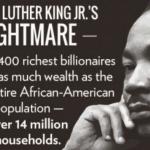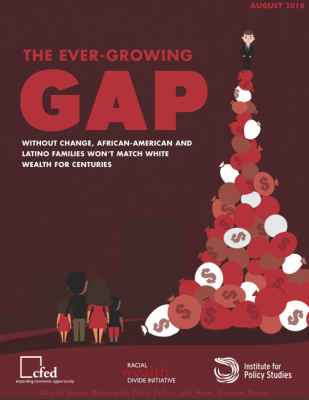The Ever-Growing Gap: Failing to Address the Status Quo Will Drive the Racial Wealth Divide for Centuries to Come
Portside Date:
August 12, 2016
Author:
Chuck Collins, Dedrick Asante-Muhammed, Josh Hoxie and Eman
Date of Source:
Monday, August 8, 2016
Institute for Policy Studies

Racial and economic inequality are the most pressing social issues of our time. In the last decade, we have seen the catastrophic economic impact of the Great Recession and an ensuing recovery that has bypassed millions of Americans, especially households of color. This period of economic turmoil has been punctuated by civil unrest throughout the country in the wake of a series of high-profile African-American deaths at the hands of police. These senseless and violent events have not only given rise to the Black Lives Matter movement, they have also sharpened the nation's focus on the inequities and structural barriers facing households of color.
However, even when these economic inequities do get attention, the focus is often on a single facet of the issue: income. The new report Ever-Growing Gap [1], published by the Institute for Policy Studies and the Corporation for Enterprise Development, focuses instead on a related but distinct facet of the issue: the essential role that wealth plays in achieving financial security and opportunity. It examines our country's growing racial wealth divide and the trajectory of that divide.

Report authors: Chuck Collins, Dedrick Asante-Muhammed, Josh Hoxie and Emanuel Nieves
This growing wealth divide is no accident. It is the result of public policy designed to widen the economic chasm between white households and households of color and between the wealthy and everyone else. In the absence of significant reforms, the racial wealth divide—and overall wealth inequality—are on track to become even wider in the future.
How far behind is the wealth of black families compared to white families?
.jpg)
Key Findings:
- Over the past 30 years the average wealth of white families has grown by 84%—1.2 times the rate of growth for the Latino population and three times the rate of growth for the black population. If that continues, the next three decades would see the average wealth of white households increase by over $18,000 per year, while Latino and Black households would see their respective wealth increase by only $2,250 and $750 per year.
- Over the past 30 years, the wealth of the Forbes 400 richest Americans has grown by an average of 736%—10 times the rate of growth for the Latino population and 27 times the rate of growth for the black population. Today, the wealthiest 100 members of the Forbes list alone own about as much wealth as the entire African American population combined, while the wealthiest 186 members of the Forbes 400 own as much wealth as the entire Latino population combined. If average Black households had enjoyed the same growth rate as the Forbes 400 over the past 30 years, they would have an extra $475,000 in wealth today. Latino households would have an extra $386,000.
.jpg)
- By 2043—the year in which it is projected that people of color will make up a majority of the U.S. population— the wealth divide between white families and Latino and black families will have doubled, on average, from about $500,000 in 2013 to over $1 million.
.jpg)
- If average black family wealth continues to grow at the same pace it has over the past three decades, it would take black families 228 years to amass the same amount of wealth white families have today. That's just 17 years shorter than the 245-year span of slavery in this country. For the average Latino family, it would take 84 years to amass the same amount of wealth White families have today—that's the year 2097.
Addressing this growing crisis:
- Conduct an evidence-based, government-wide audit of federal policies to understand the role current policies play in perpetuating the racial wealth divide
- Fix unfair, upside-down tax incentives to ensure households of color also receive support to build wealth
- Address the distorting influence of concentrated wealth at the top through the expansion of existing progressive taxes and the exploration of a dedicated wealth tax
.jpg)
Read the full report here [PDF]. [2]
[Chuck Collins is the director of the Program on Inequality and the Common Good at the Institute for Policy Studies.
Dedrick Asante-Muhammed is the director of the Racial Wealth Divide Initiative at the Corporation for Enterprise Development.
Josh Hoxie is the director of the Project on Opportunity and Taxation at the Institute for Policy Studies.
Emanuel Nieves is the Government Affairs Manager at the Corporation for Enterprise Development.]
John Case
Harpers Ferry, WV
Harpers Ferry, WV
The Winners and Losers Radio Show
7-9 AM Weekdays, WSHC-Listen Live, Shepherd University
Sign UP HERE to get the Weekly Program Notes.
Check out Socialist Economics.

No comments:
Post a Comment